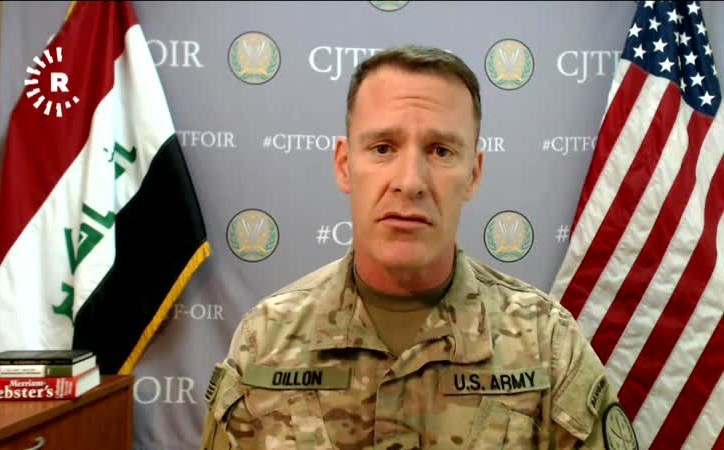ERBIL, Kurdistan Region – Turkey’s intervention in Afrin is a “bloody chapter” and a “human tragedy” that is undermining efforts to defeat ISIS in Syria, US Army Colonel Ryan Dillon, spokesman for the US-led coalition against ISIS, told Rudaw.
Speaking on behalf of Operation Inherent Resolve (CJTF–OIR), Dillon said Turkey’s incursion into the Kurdish canton of Afrin in northwestern Syria has drawn the US-backed Syrian Democratic Forces (SDF) away from the coalition’s main objective of beating ISIS.
“That is our number one goal, our mission over the last three years has been the same and that is to defeat ISIS in Iraq and in Syria. And there’s no doubt about it, the events that have happened in Afrin – a bloody chapter in the recent history of what’s happened in Syria – it’s a human tragedy – there’s no question that the exodus of some SDF fighters has slowed our advance against those final remaining pockets of ISIS in Syria,” Dillon told Rudaw.
Turkey’s incursion into Afrin, with the help of its Syrian proxies, began on January 20. Ankara claims ‘Operation Olive Branch’ was launched with the aim of creating a buffer zone along Turkey’s southern border, pushing back the People’s Protection Units (YPG), which form the backbone of the SDF.
Turkey says the YPG is affiliated with the Kurdistan Workers’ Party (PKK), a named terrorist organization. The groups deny the link.
Dillon said military leaders had noticed a fall in the number of airstrikes against ISIS targets – not because the terrorist group has been eliminated, but because a stall in SDF ground operations caused by the Afrin offensive had allowed ISIS fighters the time and space to regroup and dig in.
“If those two [remaining ISIS-held] areas [in Syria] are beehives, the problem is that if you’re not poking them and if you’re not constantly going after them, then you are not going to see a lot of those bees, those ISIS elements starting to run. So that constant offensive pressure on ISIS makes them react, makes them move, makes them talk, which allows us to go after them and kill them with strikes. So that definitely has slowed down our progress against ISIS,” Dillon explained, by way of analogy.
In the face of Turkish threats to march eastward to clear the SDF out of Manbij, where the US maintains a military presence, Dillon reiterated the coalition’s support for establishing local security forces to keep ISIS on the run and stop its fighters from regrouping and reorganizing.
“We remain committed to training and advising and supporting our SDF brethren and also the Manbij Military Council,” he said.
Asked about the situation in Iraq, Dillon again confirmed the coalition would be gradually drawing down its troop presence in the country while continuing to bolster the Iraqi Security Forces (ISF).
“We are always assessing and working with the government of Iraq to identify what the future of the coalition looks like as Iraqi Security Forces, all elements, continue to demonstrate more capacity and capabilities to conduct operations on their own. There will be a gradual decrease in coalition forces in Iraq,” he said.
“We are working with all elements, Iraqi Security Force, to include Peshmerga to make sure that ISIS cannot come back, particularly as we look forward to about a month from now when elections will be underway,” he added.
Asked where the Peshmerga fits into this post-conflict security apparatus, Dillon said the coalition is doing its best to make sure money designated to Kurdish forces reaches them.
“We do that under the government of Iraq, but we do have accounting measures to make sure that the funds and the stipends that we provide are getting to the right place. So there are mechanisms in place to make sure that money gets to the right place for the right purposes.”

